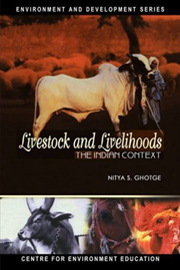Book contents
- Frontmatter
- Foreword
- Acknowledgements
- Contents
- Preface
- Chapter 1 The Beginning …
- Chapter 2 Patterns of Livestock rearing
- Chapter 3 Traditional Practices in Animal Rearing
- Chapter 4 Emerging Trends in Livestock Rearing
- Chapter 5 It must not End: Towards an Alternative Policy
- Chapter 6 Reorienting Ourselves
- Chapter 7 Framework for An Alternate Policy
- References
- Index
Preface
Published online by Cambridge University Press: 26 October 2011
- Frontmatter
- Foreword
- Acknowledgements
- Contents
- Preface
- Chapter 1 The Beginning …
- Chapter 2 Patterns of Livestock rearing
- Chapter 3 Traditional Practices in Animal Rearing
- Chapter 4 Emerging Trends in Livestock Rearing
- Chapter 5 It must not End: Towards an Alternative Policy
- Chapter 6 Reorienting Ourselves
- Chapter 7 Framework for An Alternate Policy
- References
- Index
Summary
They came to the Indian subcontinent in search of pastures for their animals. Across the cold and rugged mountain ranges, they herded their cattle and their horses and started a civilization which was to have an everlasting impact on the Indian sub continent. The Aryans, who were primarily cattle rearers, found pasture and settlements on the banks of the Himalayan rivers. The favourite food of the Aryans was panch amruth or five nectars based on products derived from milk: ghee, yoghurt and milk itself flavored with honey. Abundance was symbolized by the divine cows…Kamadhenu, Nandini and Surabhi, gifted by the Gods to the sages. The favourite god was a cowherd or Gopal whose descendants the Yadavs still practise a profession started by their ancestors thousands of years ago.
The importance of livestock in the story of human civilization is significant especially with reference to the Indian context. Animals continue to cater to the ever-increasing needs of a single species, the Homo sapien. Livestock and livestock products contribute in some way to every household, the contribution often increasing as one goes down the economic ladder. Livestock rearing forms an important livelihood activity for most Indian farmers supplementing incomes, offering employment opportunities, supporting agriculture as well as contributing to the health and nutrition of millions of households.
The livestock sector accounts for 9 % of the GDP next only to agriculture in the rural sector. However, this sector seldom performs at optimal levels and is riddled with inconsistencies and contradictions.
- Type
- Chapter
- Information
- Livestock and LivelihoodsThe Indian Context, pp. 1 - 2Publisher: Foundation BooksPrint publication year: 2004

